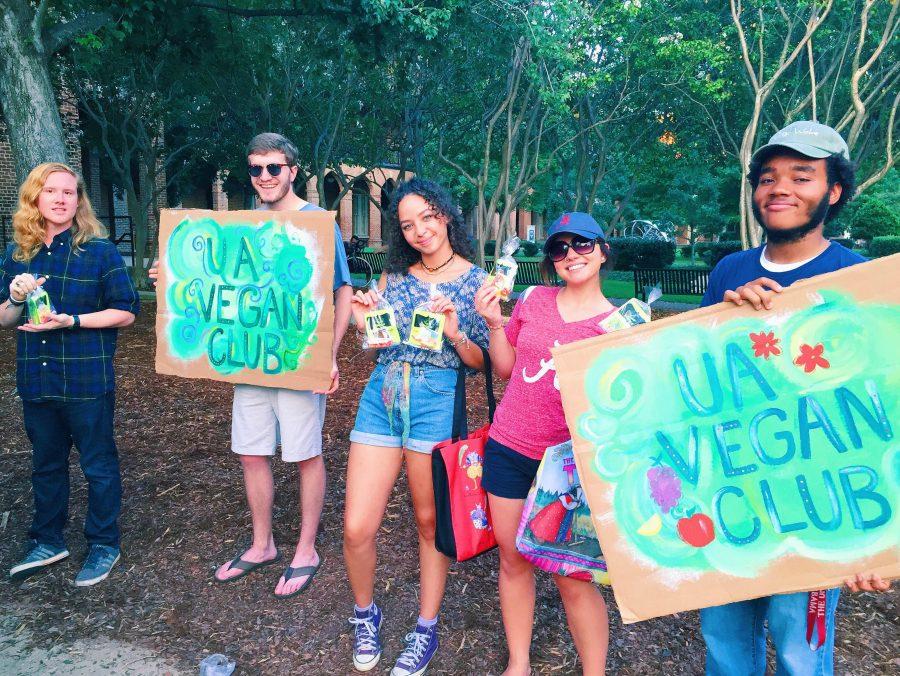“I watched a few documentaries, and I did some research,” Barley said, “and I found out that the industries that I was supporting weren’t really worth supporting.”
Going Vegan
Barley said she didn’t want to put her money towards cruel industries that she didn’t believe in, and that if she wouldn’t kill an animal herself, she didn’t want to pay someone else to do it indirectly for her.
“I think, with meat and dairy, the cruelty is obvious on the surface,” she said, “but with the egg industry, you have to do a little more research to figure that out.”
She said she doesn’t think it’s an inherently violent industry because it takes eggs from chickens that lay them naturally, but that the process has become very cruel. She said she realizes that people are providing chickens with free range or raising their own, but she thinks it becomes a health issue.
“It’s not very good for you, and personally, I think it’s a little bizarre that we eat chicken periods,” Barley said.
Barley’s decision to become vegan provided her with a new mindset. She said she feels that she has more respect for life in all of its forms.
“It’s just given me a new perspective on life in general, and it’s a pretty good feeling because I feel a little more connected to the Earth,” she said.
Though not much information is offered on veganism, Barley said if she could go back to before she became a vegan, she would tell herself to be a little more open-minded and to do more research.
“I think before I was vegan – I think with most people you just – it’s just the fact of not knowing,” she said. “I don’t think that most people don’t care. I think people care – they just don’t know. I know the information just isn’t readily available for everyone. It’s just not plastered everywhere – there’s advertisements for meat and dairy. And that’s what you’ve grown up to think.”
How She Handles It
Some believe that being a vegan in the South is difficult, but Barley said she has found ways to overcome it.
“I wouldn’t say it’s hard,” she said, “I guess the hardest part would be in social situations. I guess it’s just how people perceive me. People make a lot of assumptions, and going out to eat can be a little hard because, you know, Southern food. There’s a lot of meat and cheese, but I mostly cook for myself.”
When she cooks, Barley said she likes to buy rice, beans, pasta and fruit because it’s the cheapest and easiest way to eat as a vegan. But when she goes out to eat, she said she enjoys going to places like Moe’s, Chipotle, Mellow Mushroom and Pita Pit because they have many vegan options.
“I think my favorite restaurant would have to be Mellow Mushroom because of all of the options they have,” she said, “I think it’s awesome when restaurants recognize different kinds of people that want to eat their food.”
Barley said she’s a fan of the vegan and vegetarian options on campus, as well, but she thinks there’s room for improvement.
“Freshman year wasn’t that hard, surprisingly,” she said. “The green plates they have – the vegetarian plates – are really helpful, and I would just ask them if something includes cheese or was cooked with butter. Fresh Foods has a lot of really good options. There’s definitely not as much as there could be. I think always having a meat substitute readily available would be great.”
With the practice, Barley said vegans tend to face stereotypes.
“I guess the main stereotype would be that vegans only eat super healthy, and we’re really into nuts and berries and seeds,” she said. “And that we only really do it for our health and that we don’t really care about anything but animals. A lot of people think that I have a very limited view of the world and that it’s only for animals.”
She said she thinks people don’t realize that veganism is also a way to combat human rights issues and that people are vegan, not just for animals, but also for environmental and health reasons.
Vegan Voices
Barley said she started Vegan Voices because she wanted to meet others with the same perspective as her.
“So I had been thinking about trying to start a vegan or vegetarian club [at] the end of my freshman year [and] onward,” she said, “I actually finally did it at the end of my sophomore year… because I wanted to start it as a way to meet other people –– like-minded people –– because I was like ‘There have to be other people that think like me. I can’t be the only one.’ “
She said Vegan Voices is an all-inclusive organization that also offers information to anyone who would like to learn more information on the topic.
As of now, the organization has a little over 40 members and is working to get approved.
“After we get approved, you’re allowed to do things like chalking and tabling,” she said, “and those were the main things we wanted to do to get the word out. After we’re approved, we also plan on doing documentary screenings in the Ferg and trying to get certain professors… to give students extra credit for coming.”
She said the organization will also have planned events for September and October, such as Quad picnics, Vegan Pizza and Movie Night.
“Vegans are not as scary as people think,” she said. “We care about certain causes that don’t get a lot of attention, but that’s fine. We’re just trying to spread some awareness.”
The group meets every Wednesday at 5 p.m. in Lloyd 123.









